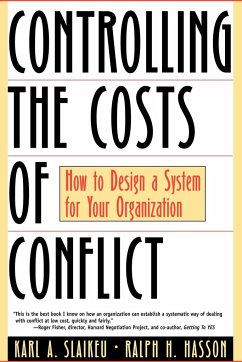In an increasingly collaborative business environment, continued success often depends on the ability of individuals, teams, and organizations with mutual interests to work smoothly together. But as any manager knows, things do not always go as planned. When the inevitable conflict arises, many companies resort to power plays, rush to litigation, or simply choose to ignore the problem-options that can cost a company dearly in more ways than one. Those costs can often be avoided, however, with the establishment of systems that promote collaboration and stop disagreements from becoming expensive disputes. Here, two experts offer four guiding principles for doing just that. Written for non-experts in jargon-free language, Controlling the Costs of Conflict shows readers how to build the kinds of policies, procedures, and practices that can cut up to 80 percent of related legal expenses, slow turnover, strengthen long-term business relationships, reduce stress, and promote the success of an organization's mission. Its clear and simple approach translates advanced concepts into practical how-tos, illustrating key points with real-world examples. From choosing the best resolution option to early intervention to fostering collaborative strength, the guidelines found here apply equally to businesses, public agencies, religious institutions, schools, neighborhood associations, even nations. These principles will help organizations diagnose the weaknesses in their existing systems or build from scratch new systems that have the power to reduce the monetary, strategic, and emotional costs of conflict.
Hinweis: Dieser Artikel kann nur an eine deutsche Lieferadresse ausgeliefert werden.
Hinweis: Dieser Artikel kann nur an eine deutsche Lieferadresse ausgeliefert werden.








